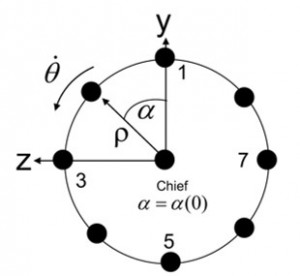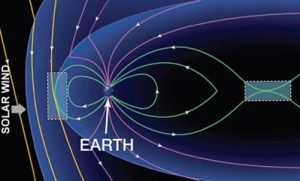Dr. Vadali specializes on optimal control of space vehicles, orbital mechanics and aircraft flight dynamics and control. Dr. Vadali has been an integral part of the Aerospace Engineering Department at Texas A&M for more than 20 years.

Basic circular formation with a slow rotation about the chief spacecraft.
Recently Dr. Vadali has been working on formation flying with multiple space vehicles.
This research is important because of its potential station-keeping fuel savings for spacecraft, large resolution imaging capabilities and surveillance capabilities. A slow angular rotation of a circular formation around the chief spacecraft will allow the orbital perturbations to affect all spacecraft equally, which reduces fuel consumption for station keeping drastically. As shown in the figure below.

Grey boxes depict the areas of interest for sensor measurements.
Other recent work by Dr. Vadali in formation flying includes the orbital optimization of the spacecraft used in Magnetospheric Multiscale Mission (MMS). The mission, launched on March 12th, 2015 is composed of four spacecraft with sensors to measure the magnetic field of Earth and it’s interaction with the solar wind. The four spacecraft must pass in a tetrahedral formation through two specific regions in the magnetic field. This must happen every orbit but due to perturbations, the formation is hard to keep throughout the whole orbit. Therefore, Dr. Vadali has used his expertise and research abilities to keep the tight formation only in the areas of interest, thereby minimizing fuel consumption and giving the potential to extend the mission duration.


